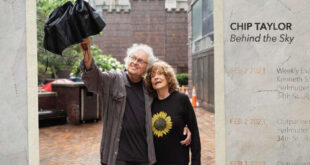Sylvia Milo’s stunning play The Other Mozart operates and succeeds on several levels.
On the most philosophical, it punches home how many more great accomplishments, how much more great work, would enrich the world’s cultures today if the female half the population had been given the same opportunities to cultivate their intellectual and artistic gifts as the male half.
Written and performed by Milo, this one-woman show is, however, free of didacticism. It tells the story of Wolfgang Amadeus Mozart’s older sister Nannerl with gravity and pluck, scholarship and humor. Milo portrays the celebrated young keyboardist whose letters and compositions have been lost to history in a stately, flowery manner, on (and in) a set cleverly conceived as one giant white dress littered with sheet music and letters, amid sprinkles and swirls of music and sound effects by Nathan Davis and Phyllis Chen.
But what makes the play marvelous – and I use the adjective advisedly – are Milo’s precise evocations, via her fine-tuned performance and poetic words, of the other Mozart’s family members, the characters she meets, and above all Nannerl herself.

She’s a little girl, before her father Leopold allows her tiny hands to touch the harpsichord, awestruck by the music she can draw from teacups.
She’s a celebrated young prodigy on tour with her father and her even more prodigal brother, whose antics and compositions soon eclipse her.
She frequents a church with a portrait of St. Cecilia playing the organ, then discovers the patron saint of musicians wasn’t a musician at all.
“Papa keeps teaching us – music, math, history, literature, even philosophy – but Mamma insists I seriously take to learning ‘the arts of housekeeping’: ‘Your future happiness lies in your husband und children. Your soul’s salvation lies in being able to take care of them. No employment of mind is sufficient excuse for neglecting domestic duties.'”
She’s disappointed in love, then finally married but relegated to an unsatisfying life in the provinces.

The story of Marianne Mozart (nicknamed “Nannerl”) is a tragedy, in the sense that her fatal flaw of being a woman doomed her to obscurity and deprived her contemporaries, and us, of what might have been great and lasting work.
Though Nannerl Mozart, who died in 1829 at 78, has been the subject of several novels and a film, it’s hard to imagine anyone can have brought her back to life with as much vivid urgency as Sylvia Milo does here. Milo, also a violinist, makes us gasp at Nannerl’s personal disappointments and furious at the unfairness of the suppression of her potential. Yet all along she coolly and brightly entertains us with a series of small stage-marvels guided by director Isaac Byrne’s precise aesthetic and abetted by the talents of a fine creative team.
Joshua Rose’s agile lighting changes colors as Nannerl ticks through the litany of fascinating cities on the family tour; later, in sad parallel, while stuck at home she reads of Wolfgang’s own triumphs abroad. Nannerl hilariously renders Wolfgang and Constanza’s verbal sex play on their visit home to Salzburg. She hesitantly mails a composition to Wolfgang and Leopold, which the former praises warmly and the latter ignores. She raises her stepchildren and plays her clavichord alone for hours in a tiny room in her husband’s house in the isolated village of St. Gilgen.
It’s a life displayed in all its fulness and tragedy in a crystalline hour and 20 minutes. Milo’s remarkably surefooted performance walks the line between mannered and raw. Words on a screen can’t do it justice. New Yorkers, go and see The Other Mozart at HERE through July 12; otherwise check the website for upcoming appearances in far-flung lands.
 Blogcritics The critical lens on today's culture & entertainment
Blogcritics The critical lens on today's culture & entertainment



